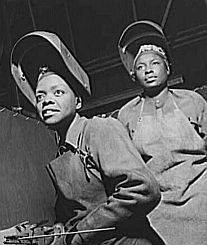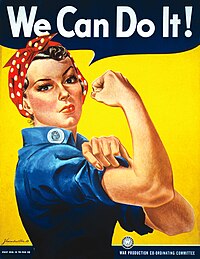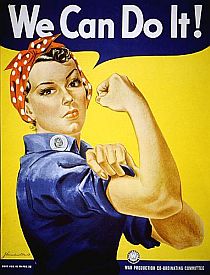New colored photos from the 40s found
New colored photos from the 40s found
Just thought some of you might enjoy looking at these like I did.
http://www.upi.com/News_Photos/Features ... a/5514/25/
http://www.upi.com/News_Photos/Features ... a/5514/25/
I don't give a damn for a man that can only spell a word one way. Mark Twain
Re: New colored photos from the 40s found

Wow... 'mazing.
Of course these women, like Rosie the Riveter always inspire me, Loca la Soldadero Soldadera
Re: New colored photos from the 40s found
I thought we didn't use the term 'colored' anymore.
yrs,
rubato
yrs,
rubato
Re: New colored photos from the 40s found
I was going to use Rosie the Riveter as the inspreation for my Pin Up girl tattoo on my back.
I wish I had now the woman that I used left me I know Rosie would never of done that
I wish I had now the woman that I used left me I know Rosie would never of done that
Re: New colored photos from the 40s found
rubato wrote:I thought we didn't use the term 'colored' anymore.
yrs,
rubato
That would be "photos of color".
Your collective inability to acknowledge this obvious truth makes you all look like fools.
yrs,
rubato
Re: New colored photos from the 40s found
"Photo-Americans"?dales wrote:rubato wrote:I thought we didn't use the term 'colored' anymore.
yrs,
rubato
That would be "photos of color".
Re: New colored photos from the 40s found
Rosie rocks! Luv her!Aard Vark wrote:I was going to use Rosie the Riveter as the inspreation for my Pin Up girl tattoo on my back.
I wish I had now the woman that I used left me I know Rosie would never of done that

...and she was most likely colored!
Re: New colored photos from the 40s found
She was? She pulled off the 'white' look rather well then...loCAtek wrote:...and she was most likely colored!

Why is it that when Miley Cyrus gets naked and licks a hammer it's 'art' and 'edgy' but when I do it I'm 'drunk' and 'banned from the hardware store'?
Re: New colored photos from the 40s found
I meant the real one [see: photo] not the propaganda stunt. Muppet!
Re: New colored photos from the 40s found
loCAtek wrote:I meant the real one [see: photo] not the propaganda stunt. Muppet!
Which 'real one" you fucking moron? And can you not tell from a photo of a black women if she is "coloured" or not?
Yet again you haven't a fucking clue about what you are talking about. Jesus, you're as dumb as a sack of shit aren't you?
Surprisingly Locatek is so dumb, she doesn't even recognise a welder, despite her claiming to be one.

Women welders in New Britain, Connecticut, 1943.
The photo is not "Rosie the riveter", it appears on a page discussing the influence of the "Rosie the riveter" phenomena.
“Rosie the Riveter” is the name of a fictional character who came to symbolize the millions of real women who filled America’s factories, munitions plants, and shipyards during World War II. In later years, Rosie also became an iconic American image in the fight to broaden women’s civil rights.
After the Japanese bombing of Pearl Harbor in December 1941 and the full involvement of the U.S. in World War II, the male work force was depleted to fill the ranks of the U.S. military. This came precisely at a time when America’s need for factory output and munitions soared. The U.S. government, with the help of advertising agencies such as J. Walter Thompson, mounted extensive campaigns to encourage women to join the work force. Magazines and posters played a key role in the effort to recruit women for the wartime workforce.
Saturday Evening Post cover artist, Norman Rockwell, is generally credited with creating one of the popular “Rosie the Riveter” images used to encourage women to become wartime workers. Rockwell’s “Rosie,” shown at right, appeared on the cover of the May 29th,1943 edition of The Saturday Evening Post. The Post was then one of the nation’s most popular magazines, with a circulation of about 3 million copies each week. In addition to Rockwell’s Rosie, however, another image would become the more commonly known “Rosie the Riveter” image.
It was only later, around the 1970s and 1980s, that the Miller poster was rediscovered and became famous as “Rosie The Riveter.” But both images of Rosie – Rockwell’s and Miller’s – were used to help enlist women in the WWII workforce. In later years, and in fact up to present times, these images have became iconic symbols of women’s rights struggles, and are occasionally adapted for other political campaigns as well. But it was during the World War II years that “Rosie the Riveter” got her start.
http://www.pophistorydig.com/?p=877
“If you trust in yourself, and believe in your dreams, and follow your star. . . you'll still get beaten by people who spent their time working hard and learning things and weren't so lazy.”
Re: New colored photos from the 40s found
I have checked with the national Women's History museum and they say the following|
And she's ready for her close up Mr DeMille.

Not black.
Rose Will Monroe was a Kentucky teenager, widowed with two children, when she moved to Ypsilanti, Michigan to take a job at Ford Motor Company’s enormous Willow Run aircraft factory. She became a riveter, playing the part of "Rosie the Riveter" in a government film promoting war bonds.
http://www.nwhm.org/online-exhibits/partners/29.htm
And she's ready for her close up Mr DeMille.

Not black.
Bah!


Re: New colored photos from the 40s found
I don't suppose that's the real Rosie though...
Why is it that when Miley Cyrus gets naked and licks a hammer it's 'art' and 'edgy' but when I do it I'm 'drunk' and 'banned from the hardware store'?
Re: New colored photos from the 40s found
"Rosie the Riveter" can either refer to that particular individual or, much more commonly, to the archetype. Your usage is the more unusual. The archetype refers to the large number of women who worked in the defense industries, many of whom were black.The Hen wrote:I have checked with the national Women's History museum and they say the following|
Rose Will Monroe was a Kentucky teenager, widowed with two children, when she moved to Ypsilanti, Michigan to take a job at Ford Motor Company’s enormous Willow Run aircraft factory. She became a riveter, playing the part of "Rosie the Riveter" in a government film promoting war bonds.
http://www.nwhm.org/online-exhibits/partners/29.htm
And she's ready for her close up Mr DeMille.
Not black.
yrs,
rubato
Re: New colored photos from the 40s found
Undoubtedly. But the real Rosie the Riveter is Rose Will Monroe.
Bah!


Re: New colored photos from the 40s found
So who's the real Spartacus?
Why is it that when Miley Cyrus gets naked and licks a hammer it's 'art' and 'edgy' but when I do it I'm 'drunk' and 'banned from the hardware store'?
Re: New colored photos from the 40s found
Does this help?Sean wrote:So who's the real Spartacus?
La Stampa/Worldcrunch :
ROME - Thesedays, in the center of Rome, tourists might just see a real gladiator fight. The modern-day Roman tough guys -- long a photo-op attraction for visitors in the eternal city -- have been busy trying to escape from a local police crackdown.
Last week, police arrested 20 people accused of threatening visitors, as well as other insurgent wannabe-gladiators trying to invade the tourist-packed turf. For months, tourism agencies had denounced members of seven Italian families --- many of them with a long list of criminal records --- for trying to monopolize the gladiator business.
Your collective inability to acknowledge this obvious truth makes you all look like fools.
yrs,
rubato
Re: New colored photos from the 40s found
There were a few different specific individuals; the song was inspired by Rosalind P. Walter, while the Norman Rockwell painting was inspired by Shirley Karp Dick.
Overtime the archetype has blurred and most modern folks don't realize the most famous icon of 'Rosie the Riveter'

...was not a Rosie at all;
The real life "Rosies" riveting-

Young African American women employed by the Douglas Aircraft Company in Long Beach, California, 1938. Two of thousands of African Americans who moved to California and through the West Coast during World War II to find work in arms and munitions plants.
It was good old-fashioned racism, that wouldn't put brave Asian, Hispanic nor African, etc. Americans on a War poster.
Overtime the archetype has blurred and most modern folks don't realize the most famous icon of 'Rosie the Riveter'

...was not a Rosie at all;
I could research it, but I recall hearing her, Geraldine's, job as a metal presser, not riveter, lasted only a few weeks.[J. Howard Miller] based the "We Can Do It!" poster on a United Press International (UPI) picture taken of Geraldine Doyle working at a factory [in 1942]. At the time of the poster’s release the name "Rosie" wasn't associated with the picture;[1] that came later when a popular patriotic song called “Rosie the Riveter” was released and Norman Rockwell painted his Rosie the Riveter.[2]
The real life "Rosies" riveting-

Young African American women employed by the Douglas Aircraft Company in Long Beach, California, 1938. Two of thousands of African Americans who moved to California and through the West Coast during World War II to find work in arms and munitions plants.
It was good old-fashioned racism, that wouldn't put brave Asian, Hispanic nor African, etc. Americans on a War poster.
Re: New colored photos from the 40s found
And yet when I posted the information on Miss Doyle you dismissed her as a "propaganda stunt"...loCAtek wrote:There were a few different specific individuals; the song was inspired by Rosalind P. Walter, while the Norman Rockwell painting was inspired by Shirley Karp Dick.
Overtime the archetype has blurred and most modern folks don't realize the most famous icon of 'Rosie the Riveter'
...was not a Rosie at all;
I could research it, but I recall hearing her, Geraldine's, job as a metal presser, not riveter, lasted only a few weeks.[J. Howard Miller] based the "We Can Do It!" poster on a United Press International (UPI) picture taken of Geraldine Doyle working at a factory [in 1942]. At the time of the poster’s release the name "Rosie" wasn't associated with the picture;[1] that came later when a popular patriotic song called “Rosie the Riveter” was released and Norman Rockwell painted his Rosie the Riveter.[2]
...muppet!
Why is it that when Miley Cyrus gets naked and licks a hammer it's 'art' and 'edgy' but when I do it I'm 'drunk' and 'banned from the hardware store'?

